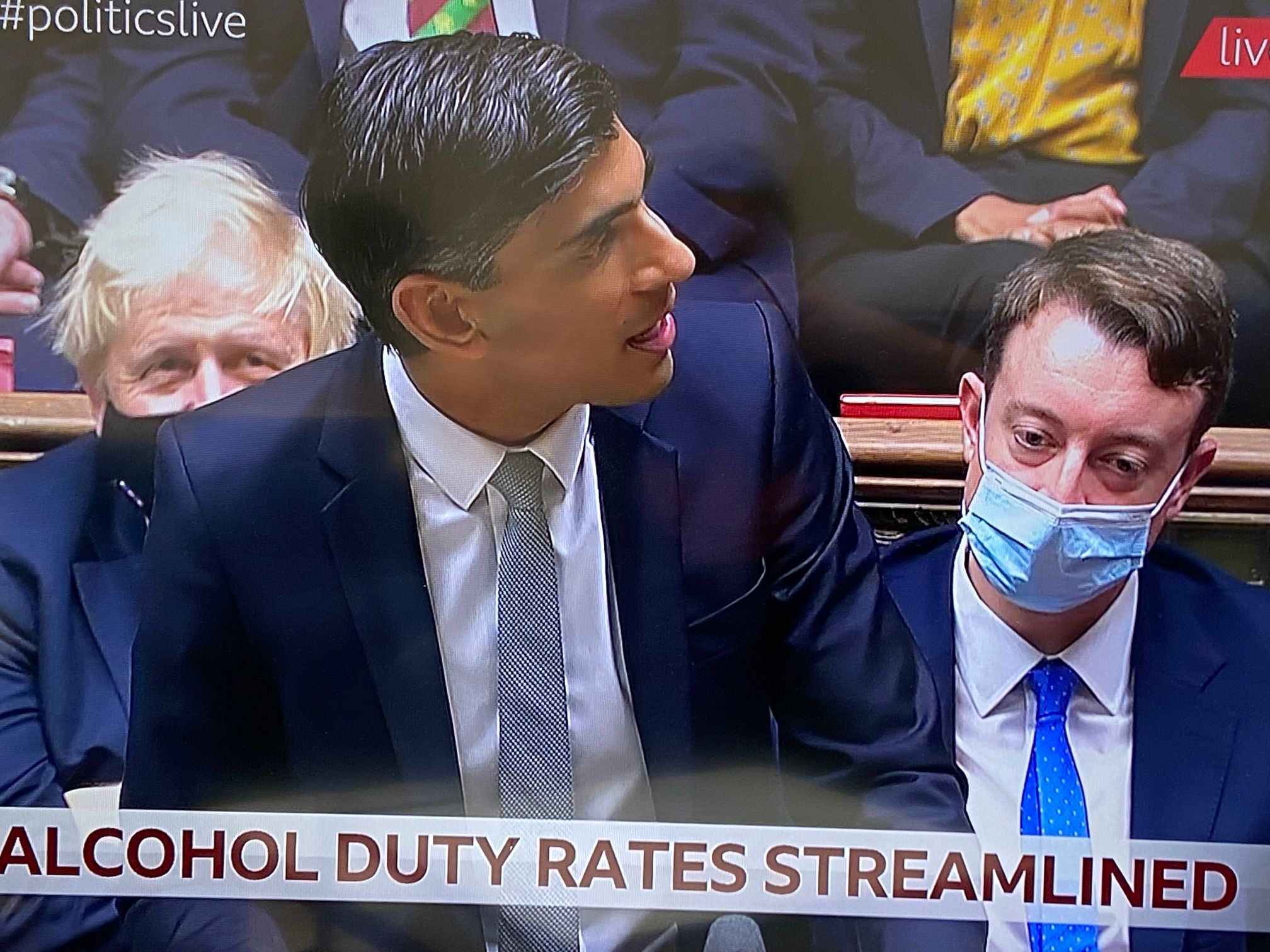The deadline to take part in the government consultation on its Alcohol Excise Duty Review (ADR) ended on January 30. But now is the time to take the fight to the ground, and make the case to local MPs that the proposed system is unworkable.
You always know a so called crisis facing the drinks industry is one to take seriously when the fine wine sector starts getting hot under the collar. Usually the fine wine merchant and brokers are happy to sit on their hands and see the annual battle over duty rises, or the health lobby play out with little comment.
But when they get agitated and start lobbying and using their connections in the quality press you know that trouble is afoot. Not because they are somehow more politically astute than the rest of us, no, it’s their unique position as global traders, that rely on smooth, fully functioning international trading conditions to do business that makes them ideal barometers of just how serious potential new legislation is for the trade as a whole.
Liv-ex, the global online marketplace for fine wine trading, sums up the situation for many when it says the new alcohol duty system “risks undermining the UK’s status as a major wine trading hub” and flies in the face of its “stated opportunity” for Brexit “to simplify regulations” rather than make them more complicated.
“The new regime will impact smaller businesses in the wine trade the hardest and threatens their traditional competitive advantage, which is to supply a wide array of artisan wines at competitive prices to customers,” it adds.
The fact Liv-ex, and other fine wine players, are willing to lend their powerful voice to the industry’s response to the government’s proposed overhaul alcohol duty system shows how serious a station we are in.
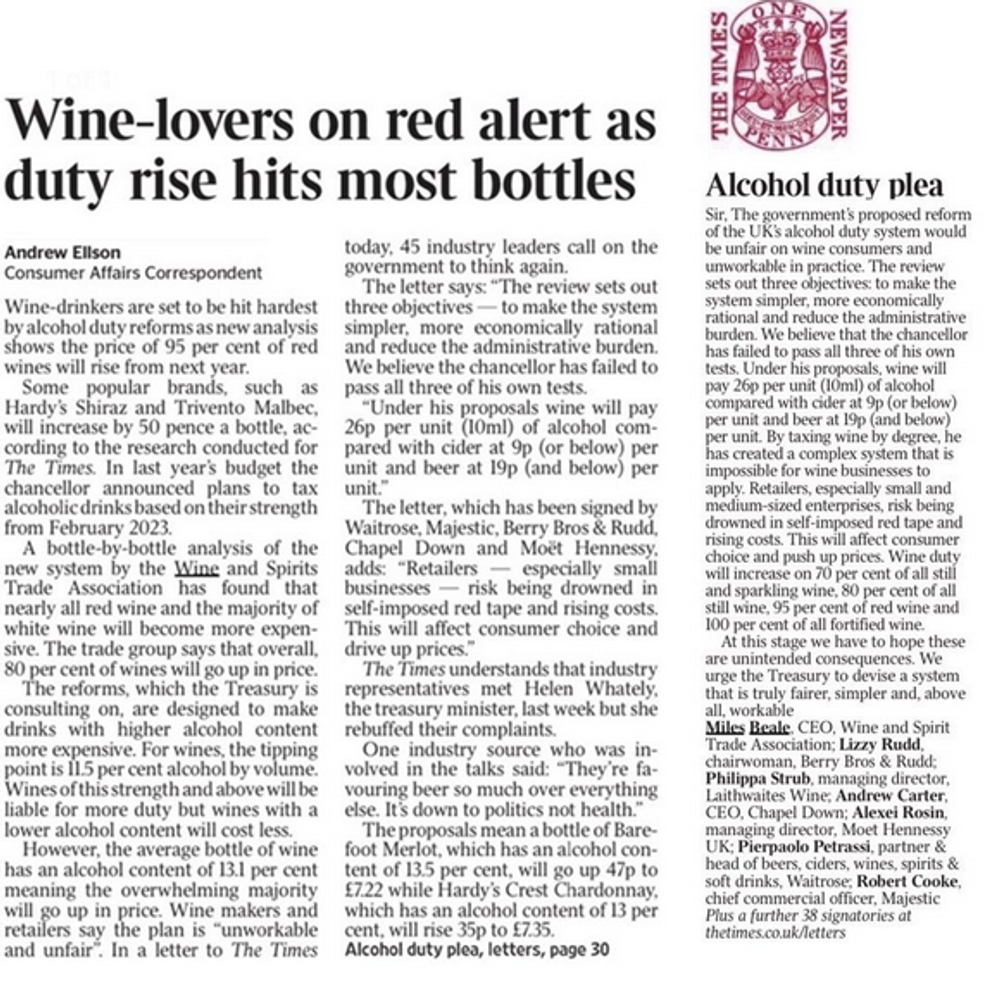
Leaders from across the wine industry have written to The Times to protest against the government’s new duty proposals
Last week 45 leaders from across the wine industry, including Wine & Spirit Trade Association, Berry Bros & Rudd, Laithwaites, Moet Hennessy UK, Majestic, Chapel Down and Waitrose, wrote to The Times to outline their concerns over what they see as “unworkable and unfair” proposals from the government.
Together they say: “The review sets out three key objectives – to make the system simpler, more economically rational and reduce the administrative burden. We believe the Chancellor has failed to pass three of his own tests.”
The letter adds: “Retailers – especially small businesses – risk being drowned in self-imposed red tape and rising costs. This will affect consumer choice and drive up prices.”
Breaking eggs
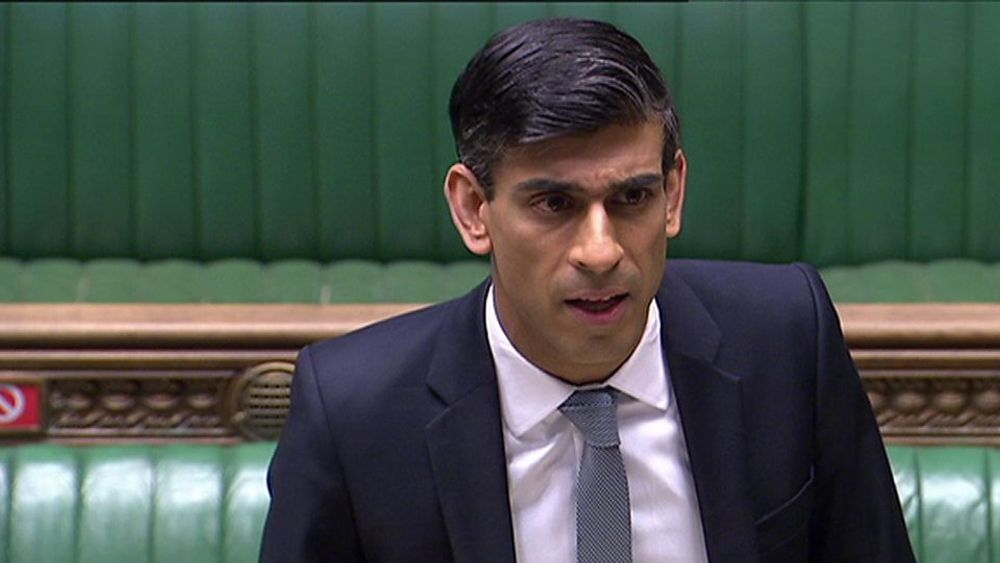
Chancellor Rishi Sunak claims the government’s new “fairer, simpler” duty system is the biggest overhaul in duty in 140 years
Ultimately the government wants to shake up what it sees as an old fashioned, antiquated alcohol duty system and replace it with what it claims is a fairer, simpler process. It has set out a five-point plan to take effect in 2023, which it claims will “simplify” duty tax brackets at an overall cost to the Treasury of £555m by 2027. A move the Chancellor, Rishi Sunak, claims is the biggest change in the UK duty system in some 140 years.
To do so it seems quite happy to follow the old adage that to make a perfect omelette you have to break a few eggs along the way. Only in this case, many in the trade believe the omelette the government plans to make is not only impossible to make, it would be inedible too.
Or as the WSTA puts it: “In no way could this be described as a fairer system, nor one that is economically rational.”
It adds: “The proposals for new model of alcohol excise duty does not right the wrongs of the current system, nor does it meet the Government’s stated aims of the review.”
What it means
The government’s new system would see 27 different bands of duty introduced by creating a band for every 0.5% of alcohol between 8.5% and 22% with different duty rates for each band. A process that would mean every bottle of alcohol held under bond in the UK would have to have their ABV checked for accuracy and applied to any future stock brought in. This contradicts government claims it is cutting duty bands from 15 to six.
What the proposed alcohol duty system would do is polarise the drinks industry even more than it currently is with very different outcomes for each of the main categories across beer, spirits, wine, cider and fortified.
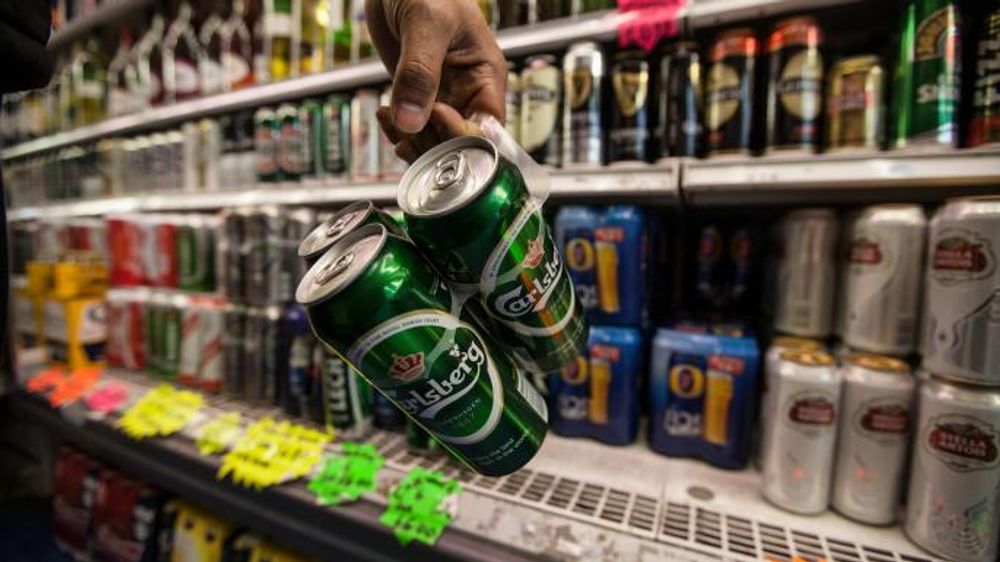
Beers and ciders are set to do much better under the new duty rules than wines and spirits
The big winners are beer, cider and sparkling wine with wine and fortified wines, in particular, very much missing out. The current premium duty rate for sparkling wine is to be scrapped and brought in line with still wine.
It means a bottle of 9.5% wine would be 47p cheaper, factoring in VAT, while an 11% bottle would rise by 12p, a 15% bottle would be 81p more expensive and a bottle of port at 20% would be £1.09 higher. Low-strength ciders will attract up to 2p less duty in pubs and shops, while duty on 2.5-litre bottles of high-strength cider will rise by as much as 45p.
Beer will also benefit from “draught relief”, cutting the tax on drinks served from pumps, such as beer and cider, by 5%.
As it stands the WSTA calculates wine drinkers will be taxed three times more than cider drinkers and 37% more than beer drinkers (on a per unit of alcohol basis). It believes it will cost the wine sector an extra £250m a year in alcohol duty.
Whilst duty on still and fortified wine would increase by an average of 20% and 30% respectively (WSTA), duties for beer and cider drinkers would fall. With spirits taxed at 29p, wine taxed at 26p per unit, compared to 9p per unit for cider and 19p for beer.

The WSTA’s Miles Beale says he is “mystified” by the new duty proposals
Miles Beale, chief executive of the WSTA, says: “We are mystified by a proposal that embeds unfairness between products meaning that beer will be taxed between 8p -19p per unit, wine increases to 26p per unit and spirits remains at 29p per unit.”
Threat to fortifieds
The fortified sector is also very much in the firing line with fears the new rules could see the average price for port and sherry go up by at least 13%, or £1 a bottle.
Andrew Hawes, managing director of Mentzendorff, which has Croft, Taylor’s Port and Bodegas Hidalgo sherry in its portfolio, says:“These proposals couldn’t be further from what the government review set out to do which was to create a simpler and fairer system.”
The WSTA even goes as far as saying: ”The government looks set to destroy the port and sherry revival with their punishing tax rises.”
Despite the protests the government seems intent on sticking to its line that the new measures “simplify the current system”. To which the WSTA bluntly says that by introducing taxation by degree (i.e., based on the ABV percentage of the product) “will be complicated, costly, and impractical”.
What the trade wants
The WSTA has set out three key ways in which it would like to see the new alcohol duty system based on which are:
1. Reduce the differences between rates paid by different categories of alcohol. The purest system of taxing alcohol not products would see one basic rate per litre of pure alcohol applied to all categories of alcohol. This really would be a fairer system than the current duty regime.
2. Extend reduced rates to support all small producers. Relief should be available to businesses making any category of alcoholic beverage and should not be restricted to those making products at less than 8.5% abv. Reduced rates should apply to genuinely small volume producers with relief tapering at a far steeper rate than currently proposed.
3. Tax all wine between 8.5-15% abv at one rate fixed in the midpoint of the band (12%) and apply the same principle for fortified wines (tax all at 18%). This would maintain the principles of the Treasury’s proposal while reducing the huge administrative burden the current proposals would have on the sector.
How to lobby
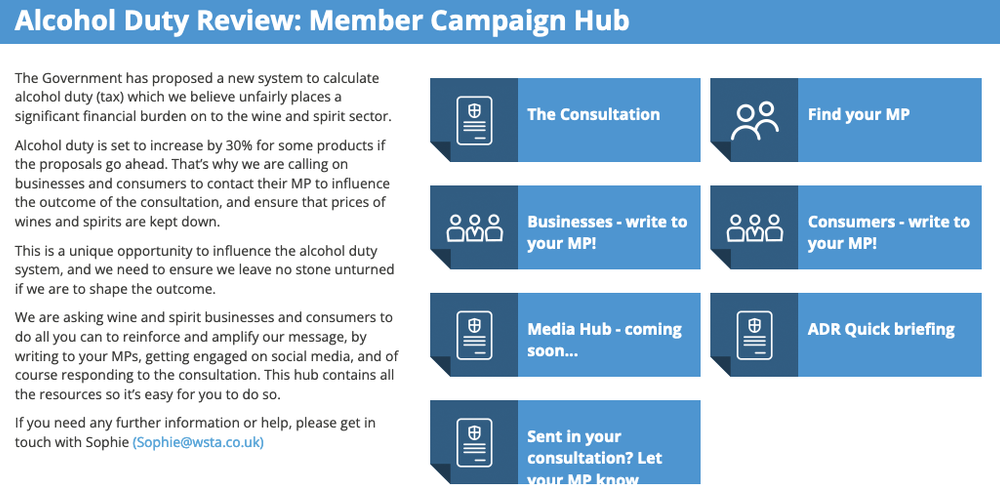
The WSTA’s campaigning hub for the trade to take action
There is still time to act and get your voice heard. The official consultation period ended on January 30 when it was possible to send your response to the government directly. That window has now closed.
But, in a way, the real lobbying starts now. The chance to influence your local MP and make them aware of how potentially damaging this will be to wine and spirits businesses, retailers and hospitality in their constituency. It is their duty to follow up any complaints and issues you raise and they have now until potentially April and May time to do that.
WSTA has set up a dedicated hub on its website that goes into great detail about how the new duty system would work and the potential damage it could create. It has also created templates letters for businesses and their customers to fill in and send direct to their local MPs to call for action.
As it explains: “This is a unique opportunity to influence the alcohol duty system, and we need to ensure we leave no stone unturned if we are to shape the outcome. We are asking wine and spirit businesses and consumers to do all you can to reinforce and amplify our message, by writing to your MPs, getting engaged on social media, and of course responding to the consultation.”
You can also get your local media, TV, radio and regional papers involved. Simply write to the editor or contact the news editors and share your thoughts and experiences with them. They are always looking for relevant and credible local business stories to share and the impact of the proposed changes in duty ticks all those boxes.
